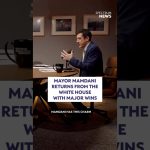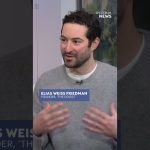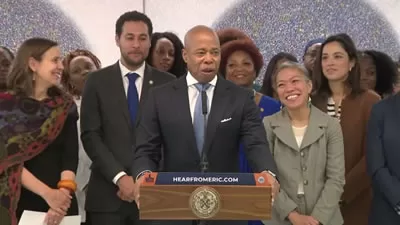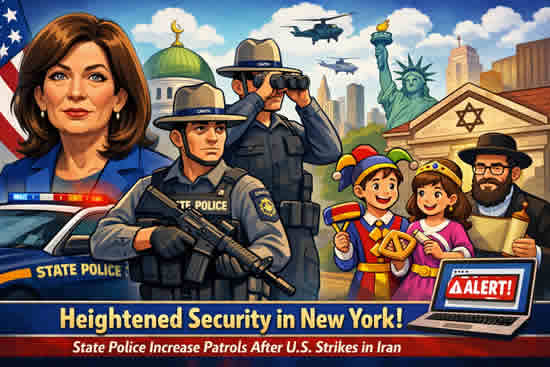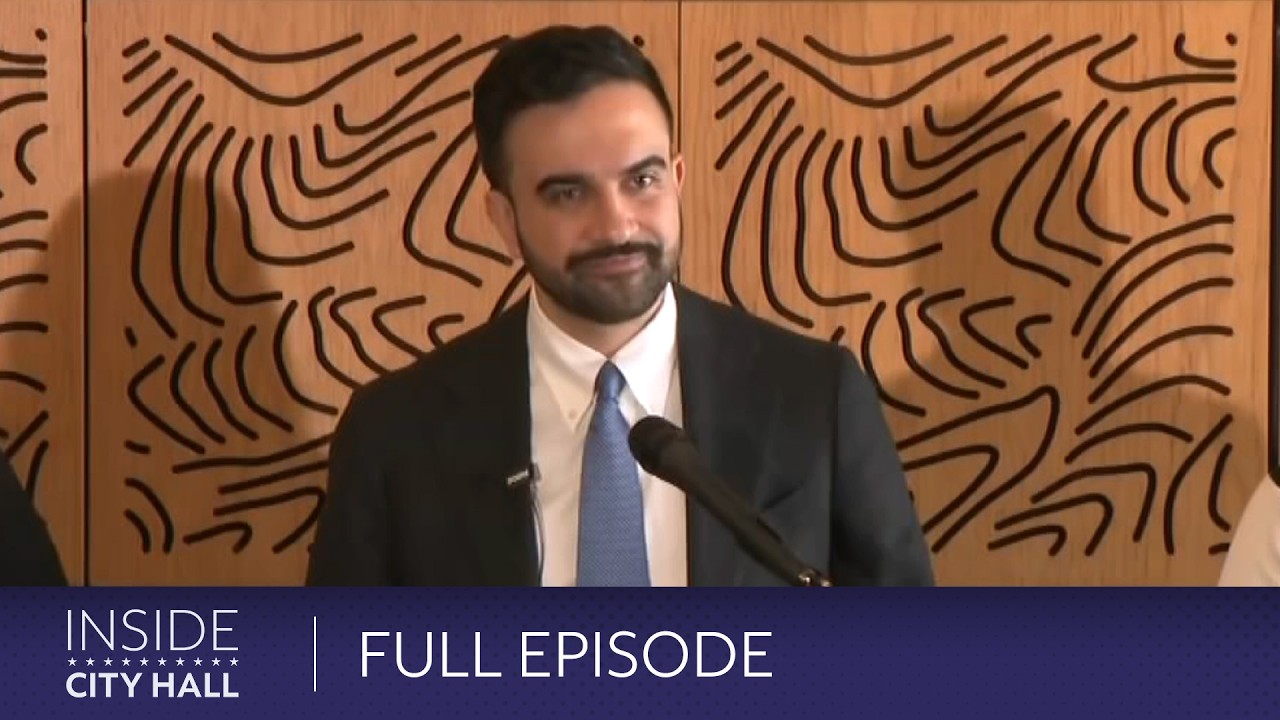Mayor Adams went on 1010 WINS radio Wednesday and talked about a lot of stuff, including tariffs he doesn’t really get, his take on subway safety after a top transportation guy called it dirty and dangerous, how he’s cool with Trump even though some Dems hate it, and that he’s running for re-election as a Dem but on his own “Safe Streets, Affordable City” line. He basically said he’s doing a great job and everyone else is wrong.
Transcript: Mayor Adams Participates in a Live Interview on 1010 WINS’ “1010 Wins Middays”
Juliet Papa: And good morning. I’m Juliet Papa, 1010 WINS, and it is a pleasure to have you, Mayor Adams, joining us live this morning for a conversation and for Q&A. Mayor Adams, welcome to our studio.
Mayor Eric Adams: It’s good to be here.
Papa: Great. You’re the 110th mayor of New York City, and we are 1010 WINS, the station of New York City, and I know you listen all the time.
Mayor Adams: Yes, I do. Your household voice, you know?
Papa: Yes, thank you. Thank you. I appreciate that. I hope in your household. But our listeners are your constituents. And potentially your voters. And we’re here to discuss the issues that matter to New Yorkers most. So I wanted to start with tariffs. It’s the dominant story here. It’s the dominant story across the globe.
The market today was down, then it was up, then it was down. It’s everywhere. But people’s 401ks are suffering. Business owners, they’re not getting their goods. Costs are going up. President Trump says it’s necessary medicine for the good of the country. Do you agree with that statement?
Mayor Adams: You know, it’s interesting. When you are honest, forthright, and authentic, you know, people want to beat you up for that. And so yesterday I said I don’t know enough about tariffs. And, you know, I don’t know everything.
As a matter of fact, I like to say that we should be honest to things we don’t know. So I spent a whole week reading up, trying to get an understanding. What does this mean? And there’s experts larger than I am, and they need to weigh in. But this is what I do know. As I shared yesterday, September 2024, we had the largest number of Americans that went to Europe.
But during that same year, we had the largest number of Americans that went to food pantries. There is a real divide. Ten percent of our wealth is here. Ten percent of the people consume the wealth. And 90 percent of the people are suffering, afraid, not only in New York, but across the entire country. Something is wrong. Is this the answer? I don’t know. And we need to figure out what the answer is.
Papa: So don’t you feel, though, an obligation that you should know about tariffs? And how is it affecting the city? How is it affecting New Yorkers here? And how can you protect New Yorkers or do the work or whatever is involved to make sure that the city is not going to go into a recession?
Mayor Adams: Yeah. And I have– that’s when you have a team, you know. Someone can say that you have COVID virus in your city. Shouldn’t you know about COVID? No, I got doctors for that. I have financial experts. I have EDC. They are now looking at what is the impact on our economy. And they’re going to sit down. They’re going to brief me. I’m doing my own research. And so mayors are not supposed to know it all. We’re supposed to have people that can inform us to make the right decisions.
Papa: How are they doing that? What are they telling you now about what to do for New York City?
Mayor Adams: Well, tariffs, they say it’s going to impact us. Is it going to be short-term? Is it going to be long-term? Is it going to have an impact on the cost of goods that are going to be increased? Is it going to be short-term? Is it going to be long-term? But we can’t ignore the fact that prior to this conversation, everyday New Yorkers have been saying the affordability issue is a real issue.
Families are no longer able to pay for food. We get longer lines on our food pantries. When I’m out feeding people in the streets, I’m seeing a different face. I’m seeing working-class people. So now do we ignore that and say let’s just keep doing business as usual? Business as usual has not been helping working-class, low-income people. We must fix that. And that seemed to be lost in the conversation.
Papa: So then what is the answer? Is this the answer? Is this tariffs and higher fees on goods in and out? Is that the answer?
Mayor Adams: That’s what the president believed the answer is. What I had to do under this administration and other administrations, what I had to do was how do I use my power to put money back in the pockets of New Yorkers?
We spent $30 billion back in the pockets of New Yorkers. Paying off medical debt. Reducing the cost of child care from $55 a week to less than $5 a week. Giving high-speed broadband for free to NYCHA residents. Paying the college tuition for foster care children. Building more affordable housing in year one and year two in the history of the city.
So we found ways from reduced fare MetroCards. We can go over and over and over again what we have done to put money back in the pockets of New Yorkers. That’s what I can control. I can’t control federal policies. I know people think the mayor of New York can control everything, but we don’t.
Papa: Alright, and just one brief final question on that issue. Would you be willing to launch trade agreements on behalf of New York or ask that New York products be made exempt in order to protect businesses here?
Mayor Adams: We’re going to look under every rock and every possibility to make sure that we maintain an affordable city in New York. And if we can do agreements where we can take New York out of any type of cost for our products here. We want people to produce products here. We want to have fair trade with those outside. We’re going to do whatever we can within the legal requirements that we can do. A lot of people are throwing a lot of ideas out there, but idealism collides with realism. We’re going to do whatever we can for New Yorkers.
Papa: Alright, so Friday you rode the subway with Transportation Secretary Duffy. And he used a rather colorful term, I would say, to describe the subway system as dirty and dangerous. And then he characterized it maybe not so much the same way after that. He said, some would say it is that word. Do you think it’s the case?
Mayor Adams: And I like that. You know, and which we often don’t want to be honest about. When I go across the country and meet with my other mayors, they say, wow, New York is a terrible place. It’s dangerous. It’s, you know, there’s encampments everywhere. I say, where did you get that from? We hear it on the radio and on TV and in newspapers. And so why wouldn’t people have a negative belief in New York when we take the worst thing in New York and highlight it every day?
We’re not highlighting that, how well we’ve done in crime. People are back on our subway system. 4.6 million riders, only six felonies a day. We don’t highlight the fact that for the last three quarters, which are 15 months, we have been decreasing crime. We don’t highlight that we have 65 million tourists, the second largest in the city’s history.
We have more jobs in the city history under this administration. More small businesses are open. So how about start highlighting the good stuff so people who don’t live in New York and they read about it, they can see the beauty of the city and not believe our subways are dirty.
So when he came and he rode with me and we talked together, he said, wait a minute, there’s something good that is going on here. We got to do better. There’s more we have to do. But the reality is we turned this city around. No encampments on our streets like other cities.
Papa: Do you think you convinced him of that, though? What was your takeaway after talking with him and meeting with him? What was your takeaway?
Mayor Adams: Well, there were several missions. Number one, many people don’t know we have a major infrastructure problem in the BQE, which connects Brooklyn and Queens. Major problem. I needed for him to come and see. And then I wanted him to come and speak to our transit police personnel. I wanted to speak with him.
And I think he what he took away was we have a mayor in this city that loves this city and he’s willing to govern the city. Like the bond raters say, they raised my bond. The bond raters have indicated you have a mayor that managed the city out of COVID, out of crime, out of the migrants and asylum seeker. And he saw there’s a leader in New York. And I knew you can’t tell people that or convince people if you don’t speak with them. It’s about speaking with people.
Papa: All right. As far as subway safety, your numbers have been great. But whatever happened to the Evolv scanners? Where is that? What happened there? Where did they go?
Mayor Adams: Well, this is what we wanted to do. I don’t know if many people realize we have a number of issues. Not only were we looking for guns, we were also looking for knives. You see a number of slashes. You see a number of people being stabbed. The experiment that was put in place identified those who were carrying knives into the system.
We hope that we deter people from carrying guns in the system. And we’re going to continue to look for new technology. They’re going to look at the report and determine if we’re going to extend the contract or we’re going to move into another direction.
Papa: And another direction would be what? Another type of similar machine?
Mayor Adams: Yes, yes. The technology is showing us that the more you use this technology, the better it becomes. When you infuse artificial intelligence and you infuse other technology, it would be ideal to get to the point that you could identify anyone that’s carrying an illegal gun in our city, in our stores, in our shops, in our subway system. And so we’re not going to shy away from that because people are afraid to try something new. That is not how I function. I believe you try. There’s nothing wrong with trying. Alright.
Papa: So do you have another pilot program coming up?
Mayor Adams: The deputy mayor of Public Safety, Kaz Daughtry, is going to look at other methods to do so. He’s going to partner with the MTA and whatever we roll out. But remember, it was Kaz Daughtry that came up with the drones to patrol our beaches, to look for those who are drowning or shock problems. It was Kaz Daughtry who came up with methods of going after stolen vehicles by using chips in cars. So this creativity and what they know from me, I say try. Let’s not be afraid. We’re a City of Yes, not a city of fear.
Papa: Alright. So you’ve often said you want to work with and not be at war with the Trump administration. And, in fact, some of your one-time supporters say the last thing you should be doing is working with him. So how far are you willing to go to work with the Trump administration? And how far is too far?
Mayor Adams: You know, I’m not quite sure what’s going on with our psyche. I was looking at someone sent an article to me in the poll where people say assassination should be used for political disagreements. This anger is we really need to get it under control. When you see a person come to the city and assassinate a CEO and all of a sudden we’re turning them into a hero, this is not what you do in a democracy. Your tool is to vote.
We have a president that won the popular vote, a president that won the majority vote. The American people decided who they wanted to lead them. That’s the democracy that I know. It’s not the democracy that you only respect when you get the person you want. And so he’s the president of the United States. I have to collaborate with him to bring resources to the city, not spend four years of just finding ways to call him names.
Now, if we disagree on something, we have a corporation counsel. We disagree that $80 million was called back from us. We disagree that some of the money that we were doing with FEMA was removed. You go to court and you let the judge decide if you’re on right grounds or if you’re not on right grounds.
That is the rule I’m living by, and I can’t be any clearer. If I needed someone to secure the border, he did that. I needed collaboration with HSI and ICE to go after dangerous violent gang members, which 80 percent of New Yorkers believe we should do. He did that. So there are places we’re going to agree. There are places we’re going to disagree. But I’m not going to be disagreeable just because of a person’s name.
Papa: Right, but you, last night, an executive order was signed, not by you, and you, in fact, recused yourself. Why do you feel you needed to recuse yourself from the Rikers location?
Mayor Adams: No, no, no, I did not, Juliet. I did not recuse myself. People play around with terminologies. I delegated. I’m the mayor. I keep saying, just as you were asking me about tariffs, you delegate.
I have a first deputy mayor on board, Randy Mastro, an excellent attorney, an excellent first deputy mayor. When he came on board, I delegated to him. I said, I need for you to look at this with an unbiased eye so no one can say that there’s some bias in the determination. I delegated.
Papa: Why couldn’t you do it, though, as the mayor? If you’re the mayor and there’s no further relationship or that you don’t feel any sort of being beholden to the Trump administration, why couldn’t you do it?
Mayor Adams: Well, first of all, I swore in federal court that there was no beholden-ing. First, people criticized that, hey, you’ve got a case hanging over your head. Now, no case is hanging over my head. Now, they’re becoming creative again.
You’ve got to ignore the noise of people who would never be happy no matter what you do. Do I go in and become the chancellor? No, I got a chancellor. Do I go in and become the H and H person? No, I have Mitch Katz to do that. You delegate as the mayor. Nothing is wrong with that. And you know what? If I would have delegated under President Biden, no one would have anything to say.
Papa: Do you think it could bring more challenges? Council Speaker Adrienne Adams was already saying, you know, in violating sanctuary city.
Mayor Adams: That’s the beauty of our judicial system. Our judicial system says if you disagree, let an impartial judge decide. Now, here’s what she said is a violation of the sanctuary city law. We are saying that ICE, HSI, FBI should coordinate with NYPD, Department of Correction, to go after dangerous felons who have created violence in our city.
I have been very clear before the election. If you are documented or undocumented, we’re going to hold you accountable. But if you are undocumented, if you harm innocent people, migrants or non-migrants. After you serve your time, you need to be deported. We don’t want you in this city to hurt innocent New Yorkers and other people who are in the city.
Papa: So do you think you compromise your own democratic principles doing this? Having an executive order signed and not by somebody else and not doing that yourself?
Mayor Adams: Juliet, that doesn’t even make any sense. Come on. My executive order is all mayors…
Papa: But you were elected as a Democrat. As a Democrat, right?
Mayor Adams: Okay, tell me cause you’re losing me on this one. I have to understand. You’re saying that the democratic principles were lost because we put Police Department, DOC, FBI, HSI…
Papa: Because of sanctuary city.
Mayor Adams: So what is the violation of it? I’m not understanding the violation of it.
Papa: Sanctuary city compromises what you are entitled to do and how to protect other people.
Mayor Adams: Right. And here’s the rule of the city so we can be clear on that. The rule of the city, the law I should say in the city, is that we cannot collaborate with ICE for civil enforcement. We can for criminal enforcement. That is what we’re doing.
That is in complete conformity not only to the law but also in conformity to 80 percent of New Yorkers. Someone commits a violent crime, they’re convicted. After their conviction, they can be deported from this country. I support that. That is in conformity with all the laws of the city.
Papa: Alright, let’s get to the campaign. You’re running as an independent. And you were asked an interesting question yesterday. Yesterday, that you were able to, let’s say in a way, walk in between the two parties because you yourself say you take an unorthodox approach to things. So where does this get you? Does it get you Republican votes running as an independent? Where does it get you?
Mayor Adams: Well, first, I’m still a Democrat. You know, because people… I’m running. And that’s why it’s so good to do the show. You know, because, if people look at the blurbs, they figure they got the answer they did. I’m still a Democrat. Did not change my party. I’m running on an independent line. The law allows anyone, there are several people that are running on independent lines. Now there’s a, there’s a party called the independent party. Right. That’s not what I’m running on.
Papa: Correct. What is your party? Are you going to name your own party?
Mayor Adams: Yes. My own line. Not my own party. My own line. It’s going to be, and I’m breaking news here, because it’s going to be Safe Streets, Affordable City. That’s my line. Safe Streets, Affordable City. It’s the first time I’m mentioning it. I’m mentioning it to you because I adore you as a reporter. You know.
But, because those are the issues that are important to New Yorkers. They want a safe city. They want an affordable city. And I want them to know that is what I produced for them. So, I have to gather signatures. I picked up 25,000 signatures when I was on the Democratic, going to the Democratic primary. But now I have to go back and get more signatures for a line that’s an independent line that I’m running on as a Democrat.
Papa: Right, and I know you’ve been underscoring all of that. You were talking also yesterday about the idea that you had for migrants and where they would be and how to handle it. If the Trump administration offered you a position, would you consider taking a position in the Trump administration?
Mayor Adams: Think about that for a moment. I have the greatest job in politics on the globe. The mayor of the most important city on the globe. No matter where you go. I have mayors in other rooms talking and everybody just finishing their conversation. But when I say I’m the mayor of New York, everyone stops. It’s like an [inaudible] moment. Why the heck would I leave the greatest mayor job on the globe?
I’m happy where I am. I love serving the people of this city. I love fighting for them. I love when people walk up to me and say, I have housing because of what you’ve done. I feel safe on my block. I can now play on the street where encampments were before. I’m able to deal with real issues with real people. Like the town hall yesterday. These were real people and that’s the best job on the globe.
Papa: Right but why did you hold up that government gangster book?
Mayor Adams: Did you read the book?
Papa: I have been reading the book. Why did you hold up that book?
Mayor Adams: I was baffled when this happened to me. I’m a reader. I started doing a lot of readings. I came up on that book and I never thought I would be reading that book. Someone said, Eric, you should read this book.
Papa: What did you find in that book that appealed to you?
Mayor Adams: What President Biden said. President Biden of the United States of America stated his Justice Department was politicized. That’s what I found in that book. I found the person who was an insider that exposed how we politicize and weaponize our criminal justice apparatus.
It’s one thing if people read the book, called Government Gangsters. If you read it and you say, wait a minute, this is factually incorrect. Did you see anything in that book that was factually incorrect?
Papa: I’m reading it and I’m trying to follow it.
Mayor Adams: I’m going to ask that. I want you to share that with me.
Papa: So do you think there’s a deep state here? There’s a deep state looking for you or out to get you?
Mayor Adams: Here’s the definition of a deep state that many people don’t understand cause we don’t like the terminology of it. You have people who are in government 30, 40 years. Presidents, mayors, governors come and go. But there’s a permanent government in our country and cities. And oftentimes they believe that they are not electable. And they believe they can hijack the mission of those that people elected. Think about this for a moment. Think about this, Juliet. Think about this.
Papa: So is that here?
Mayor Adams: Think about this for a moment. Think about this. What did the Southern District of New York interpret themselves as? Let me follow this through. Let me follow this through. The Southern District said that they’re sovereign. Who made them sovereign? The Constitution didn’t say they were sovereign. The American people didn’t vote for their sovereign state.
How can an entity in our country believe they answer to no one, not even the president? That should be problematic for every American. And so when you find out that an entity believes we answer to no one, absolute power can be absolute abuse of power. And so people may not like the author of the book, but the question is to read it and see is it factually correct. Don’t talk about the author. I don’t read books based on who the authors are. I read books based on is the information in it factual. And so when you finish the book, I want you to share with me, was there anything in there that was not factual?
Papa: Okay. Maybe our facts are interpreted a little differently here. But I know, you know, we’re running out of time already, and I just need to go.
Mayor Adams: Are you kidding me? We’ve got a couple minutes.
Papa: I know. We can keep going. We can keep going. But actually we wanted to ask you a couple of questions here. You’re all over the city, right? Yes. You talk to people all over the city. What is your number one quality of life issue in the city?
Mayor Adams: Well, rats. You know, I’m a big believer. Those little pesky rodents can disrupt your entire day. And so when we brought on our rat czar, containerized 75 percent of our garbage, no one said that we could do it. We got it done.
Papa: Are you for birth control for the rats?
Mayor Adams: Whatever we can do to deal with the rat population, I’m hearing that birth control is a method that could be used. We want to look into that. Our rat czar has, you know, she’s been highlighted for the work that she has done, decreasing rat complaints. That’s a quality of life issue. Start your day and have a rat run across your feet when you go to your garbage, or you take off the lid and a rat pop out.
You know, that would disrupt your whole day. Okay. Go ahead. So we zeroed in on several quality of life issues. Number one, we zeroed in on the cleanliness of the city. The city must get clean. Number two, we dealt with the illegal vehicles and three-wheelers and two-wheelers, bikes. 80,000 removed off our street. 80,000.
Number three, the encampments. We had people living in cardboard boxes on the side of highways, under the trains, in the train tunnels. We removed them off our streets, and we have a real process in doing so. A thousand. Not like other cities. Go look at other cities. So the city must be clean, it must be safe, and it must be attractive. That’s how we had 65 million tourists, the second largest tourism [numbers] in the history of the city that came to the city.
Papa: Okay. And just quickly now, I wanted to ask you, I know the police commissioner wants to do a quality of life comp step. What is that going to focus on? What are the issues? What are the quality of life places or locations that she’ll be looking at? I know it’s a pilot program.
Mayor Adams: And I don’t want to steal her thunder, so she should come on and speak with you.
Papa: Okay, good. That will be the next Q&A.
Mayor Adams: It’s a smart idea because New Yorkers are concerned when they call 311 because of these quality of life issues. Abandoned cars, trash piled up. I drive around the city now, and if I see trash piled up somewhere, I will take a picture, send it to the Department of Sanitation commissioner.
So she’s going to go after those issues that everyday New Yorkers are concerned about. The cleanliness of the city. Like I said, the cars that are abandoned, noise complaints. And so she’s going to make sure every precinct is being accountable for addressing those issues and referring them to the proper agencies.
Papa: And if you weren’t mayor, what would you be doing?
Mayor Adams: I would be the deputy mayor.
Papa: In whose administration?
Mayor Adams: No, seriously. Only kidding. This is my dream job. It’s the moment in time that I’m able to do it. I’m blessed that working class people chose me as the mayor of the city of New York. So I would probably be part of some type of volunteer effort, reentry program, spending time as a state senator. I was the ranker on crime and correction. I visited a lot of correctional facilities. I want to do something to stop people, particularly with learning disabilities, from going into the criminal justice system.
30 to 40 percent of our inmates have a learning disability. And I want to do something at an early stage, like we’re doing with our dyslexia screening. I want to dedicate my life to helping those young people realize they’re not dumb, they just learn differently, and that is what I would like to do. And I would just like to commit my life to it.
Papa: Alright, just two more questions for you. You know, when you first became mayor, you met with Governor Cuomo for some advice and everything. What kind of advice did he give you? Did it help you? And considering what the situation is now, what about that advice?
Mayor Adams: Not only did I meet with him, I met with all the mayors previously. I read a lot of books on mayors. Mayor Dinkins was a mentor to me. I sat down and spoke with mayors across the country. Mayor Turner, who just died, Houston mayor, was another mentor.
People who have been in these executive positions, you should hear from, listen to, and decide what information you’re going to take with you. And all of them said, listen, there’s going to be difficult moments. There are going to be dark moments, moments you wish you got out of bed and moments you wish you would have stayed in bed, but just keep pushing through.
Papa: Do you think his positions, he’s been talking pretty tough about how he would deal with the Trump administration. He’d say he would take, you know, very different from you, that he would take on a position of, you know, hey, we’re not going to have anybody bully us around and we’re not going to have anybody pushing our front door. Do you agree with that stance?
Mayor Adams: Well, I think that when people are campaigning, they can say anything. Being the mayor is a complex job every day. This is different from being a governor, being a state senator, a council person. The mayor is a different story.
People see you, they know you, they attach everything to you. And so I don’t know if that bubble that he has lived in for so long, he’s going to understand that bubble bursts when you become a mayor. The people hold you accountable as the mayor of the City of New York, and you have to be willing to be engaged with them. You see how I’m at my town halls. You see when I walk the streets. I’m not afraid of New Yorkers. I love New Yorkers. I’m one of them. And that’s the difference from being behind a glass gate as a governor.
Papa: So you had mentioned that some of the candidates are Eric-like, or was it Eric-light?
Mayor Adams: L-I-K-E. Right, right, Eric-like.
Papa: So why? Are they, like, stealing your ideas? Governor Cuomo had, you know, I’m going to put more cops in his position paper. I’m going to put more cops on the subway. But you’re doing that.
Mayor Adams: Thank you. Here’s the difference between me and them.
Papa: How about him and you?
Mayor Adams: Okay, they’re all the same. I like to say Cuomo and the seven socialists. They are running from their record. I am running on my record. They’re running from bail reform. They’re running from the crisis that they created in homelessness. They’re running from what they have done in our educational system. I’m running on my record. That’s the big difference. And that’s the exciting part, that I’m able to say, here’s what I have done.
Let me tell you something, Julia. If we didn’t have this case that I had to go through for 15 months while still serving the people of New York, they wouldn’t be running. They knew that I turned around this city. And they knew to get on a debate stage with me and hear the things I’ve done for the people of the city of New York that I love and delivered, they knew they should not be sharing the stage with me.
Papa: So given your poll numbers, though, do you really think, and I don’t know how much money you’ve accumulated since the last outing, do you really think you have a realistic shot?
Mayor Adams: Without a doubt. Remember, go back to when I ran in 2021. Andrew Yang was beating me by double digits. He was walking around with a tape measure, measuring the drapery in Gracie Mansion in City Hall. And people [said], you can’t beat Andrew Yang. It’s not possible. We’re not calling the mayor of the city of New York Yang. We’re calling him Adams.
Papa: Okay, finally, would you agree to a one-on-one debate with Governor Cuomo here in our studios? We’d have you back here.
Mayor Adams: I would love that. We have Cuomo and the seven socialists have to figure out who’s going to win the primary. I would see whoever’s going to win the primary. I’m not going to waste my energy on who’s not going to be running.
My opponents would be in the November primary. So when they finish doing what they have to do, we will compare our records. And I’m looking forward to that so much.
Papa: Alright, so maybe we’ll have you back here. The invitation is open, and I would like to thank you, Mayor Adams.
April 9, 2025 New York City Hall
Source: NYC.gov , Midtown Tribune ,
Big New York news BigNY.com






